Direct traffic is one of the most misunderstood metrics in Google Analytics. When reviewing your website analytics, you’ll notice traffic coming from various sources like organic search, paid search, referral, and social. But what exactly counts as “direct” traffic, and why should you care?
In this guide, I’ll explain exactly what direct traffic is in Google Analytics (including GA4 specifics), help you understand where this mysterious traffic actually comes from, and show you how to properly categorize these visits to get more accurate analytics data.
Table of Contents
What is direct traffic in Google Analytics?
Direct traffic in Google Analytics refers to website visits that occur without a clear referral source. These visits typically happen when Google Analytics can’t identify how a user arrived at your website.
The most common legitimate direct traffic occurs when users:
- Type your URL directly into their browser
- Click on a bookmarked link to your site
- Use browser autofill to navigate to your site
However, traffic also gets miscategorized as direct when it’s from other sources that really should be tracked!
Trackable Sources of Direct Traffic in GA4
Google Analytics 4 classifies traffic as direct when it can’t determine the referral source. That doesn’t only happen because of typing in the URL or clicking on bookmarks, though! Here are the main trackable sources that often get lumped into direct traffic:
- Email marketing campaigns – Depending on your email platform, clicks from email marketing campaigns appear as direct traffic unless properly tagged with UTM parameters.
- Dark Social – This term, coined by Rand Fishkin of SparkToro, refers to traffic from private messaging channels that strip referrer data, including:
- WhatsApp and Facebook Messenger
- Slack and Discord conversations
- TikTok and other social apps that don’t pass referrer data
- Offline document clicks – Links clicked in PDFs, Word documents, PowerPoint presentations, or other offline files.
- Broken tracking – Traffic from HTTPS sites to HTTP sites (missing secure referrer data).
- Expired sessions – When a user visits your site, leaves, and then returns after their Google Analytics session has expired.
According to research by GroupM, dark social sharing can account for up to 84% of consumer outbound sharing from websites, yet is typically misattributed as direct traffic in analytics tools.
Direct Traffic Video Walkthrough
Direct Traffic in WordPress
If you’re using MonsterInsights, you can easily see your traffic sources in your WordPress reports.
MonsterInsights is the best Google Analytics plugin for WordPress. It allows you to easily connect your WordPress site with Google Analytics so you can view all the data that matters most right in your WordPress dashboard.
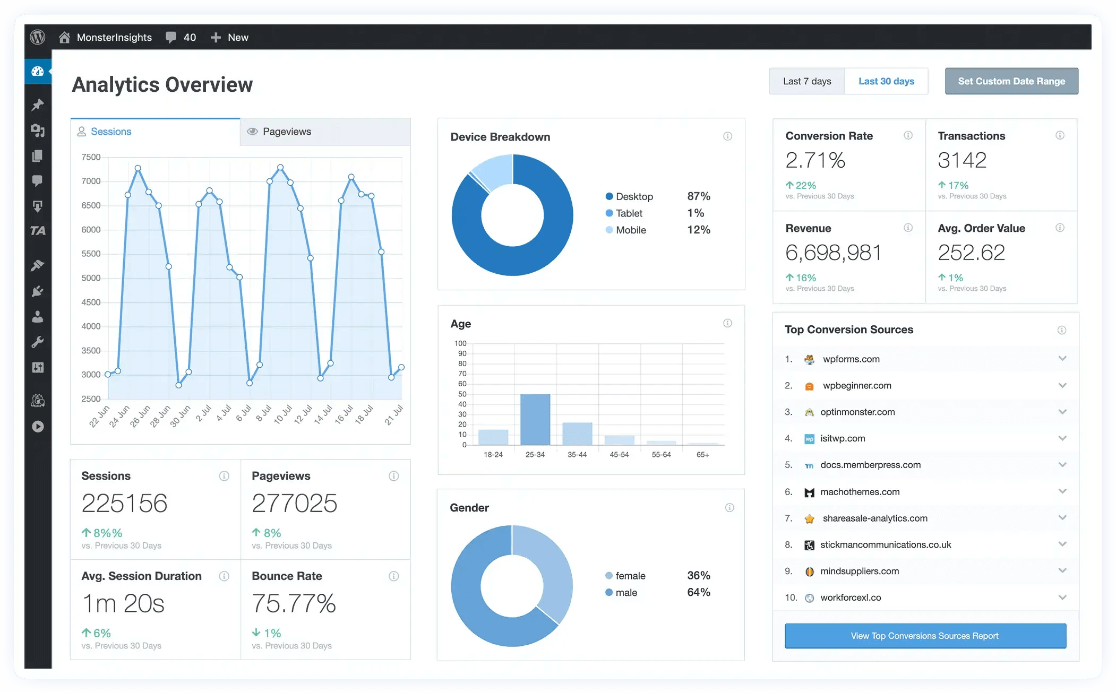
Plus, with the click of a button, you can set up sophisticated tracking features such as event tracking, eCommerce tracking, form tracking, custom dimension tracking, outbound link tracking, and more.
To get an overview of how much direct traffic you’re getting in comparison to other channels, navigate to Reports » Traffic » Overview.
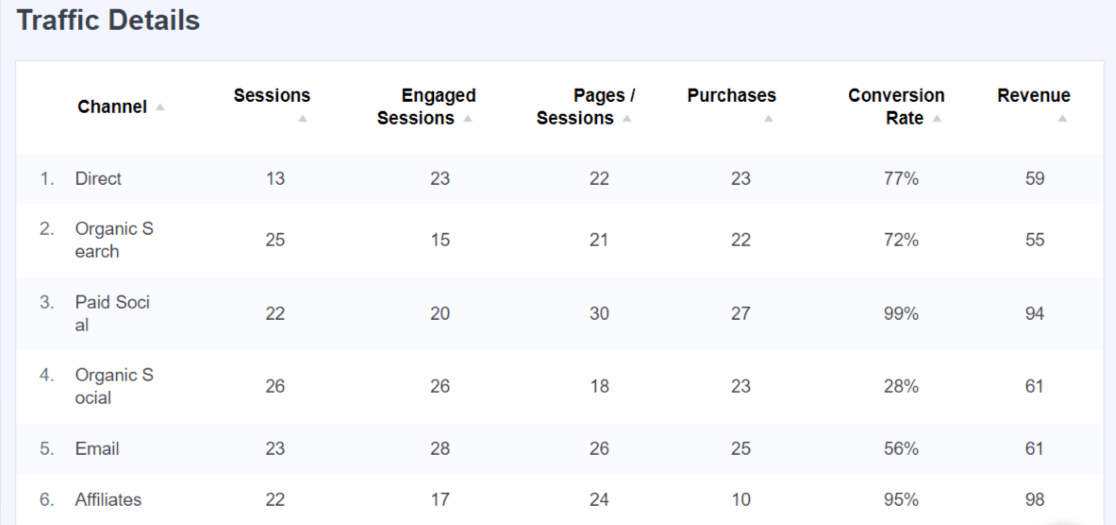
Here, you can see how many sessions are coming from direct traffic and easily compare how traffic from other channels is converting, engaging, and more.
Where to Find Direct Traffic in Google Analytics
In Google Analytics 4, you can view your website’s direct traffic by navigating to Acquisition » Traffic acquisition.
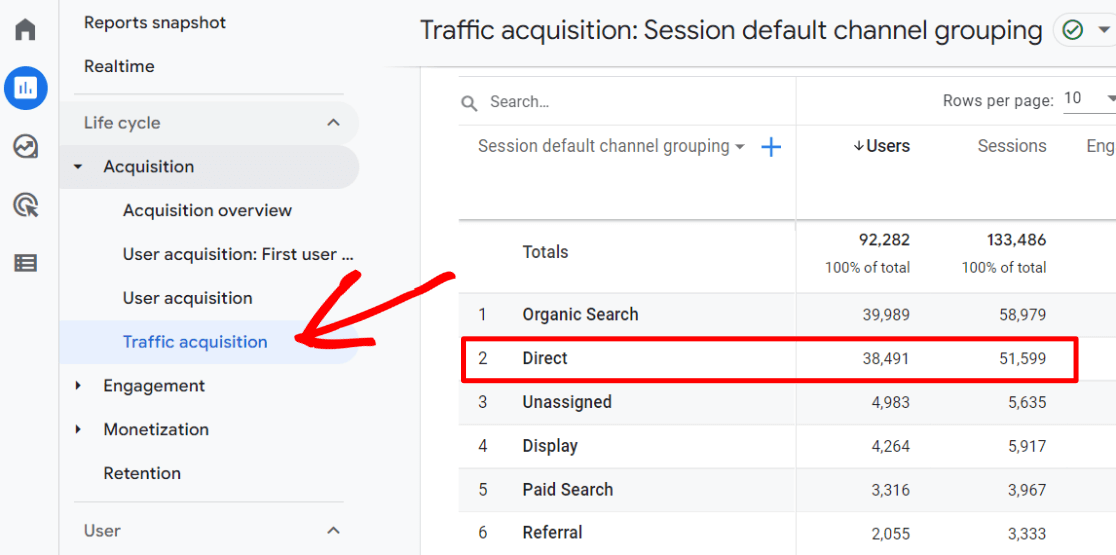
If you want to see the pages that your direct traffic landed on, click the blue plus sign to add a secondary dimension:
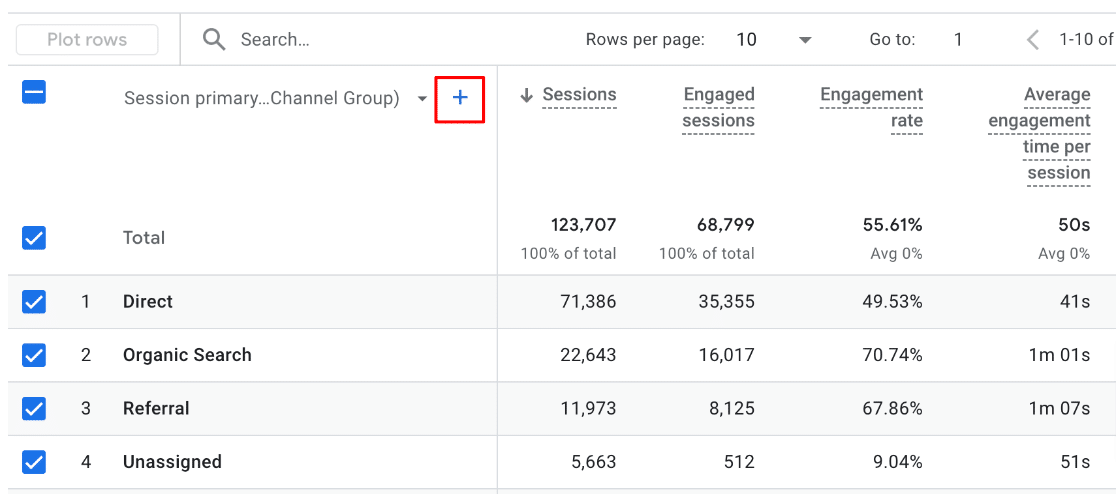
Then, choose Page / screen » Landing page + query string to add it to your report:
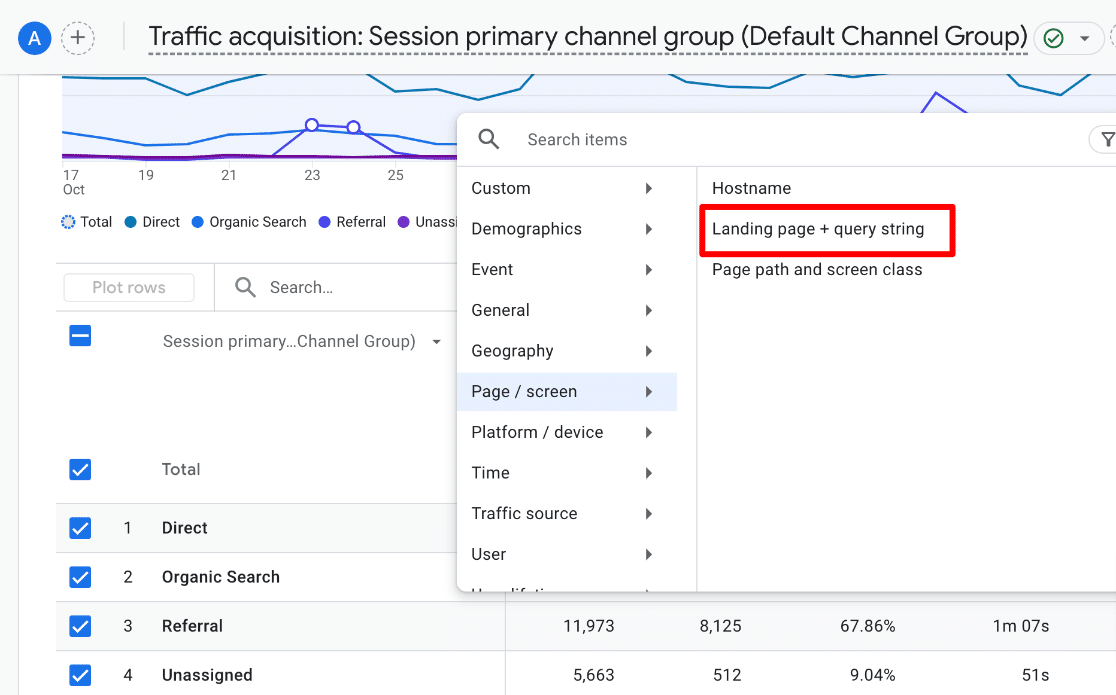
Finally, search “Direct” in the search bar to see which pages your direct traffic landed on:
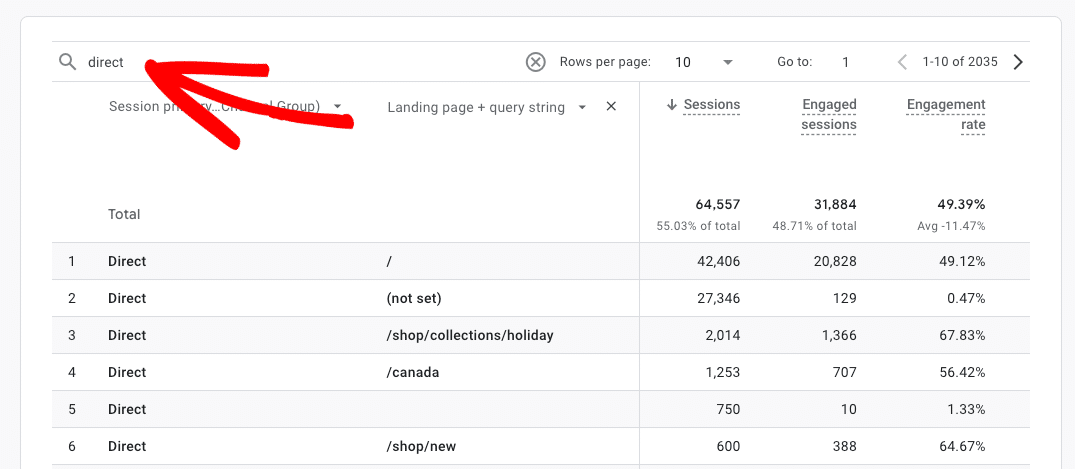
Now if you scroll down to the table, you’re looking at just the pages that your direct traffic visited.
You now have a list of the pages your Direct visitors are landing on. With this, you can think about why visitors might be landing directly on those pages and see if you can come up with ways to better categorize that traffic.
How to Fix (Reduce) Direct Traffic in Google Analytics
Identifying the exact sources of your traffic is essential for making informed decisions for your website. The best way to fix direct traffic and move that traffic into the correct buckets is to use campaign variables (UTM code) in your links. That sounds intimidating, but we have a tool to make it easy!
A URL builder tool makes creating campaign URLs easy. A campaign URL is just your regular URL with a few bits of code at the end that tell Google Analytics about the traffic coming from those link clicks. Use campaign URLs any time you want clicks to your site to be tracked in the correct channel!
If your website is on WordPress, the MonsterInsights URL Builder is the easiest way to tag your URLs with custom campaign variables. That way, you can identify the exact traffic sources (like an email, a PDF, or a link you share on TikTok or Discord) and track the performance of your campaigns.
To use the URL Builder tool, first install MonsterInsights. Then, you’ll find the tool by visiting Insights » Tools and clicking the URL Builder tab.
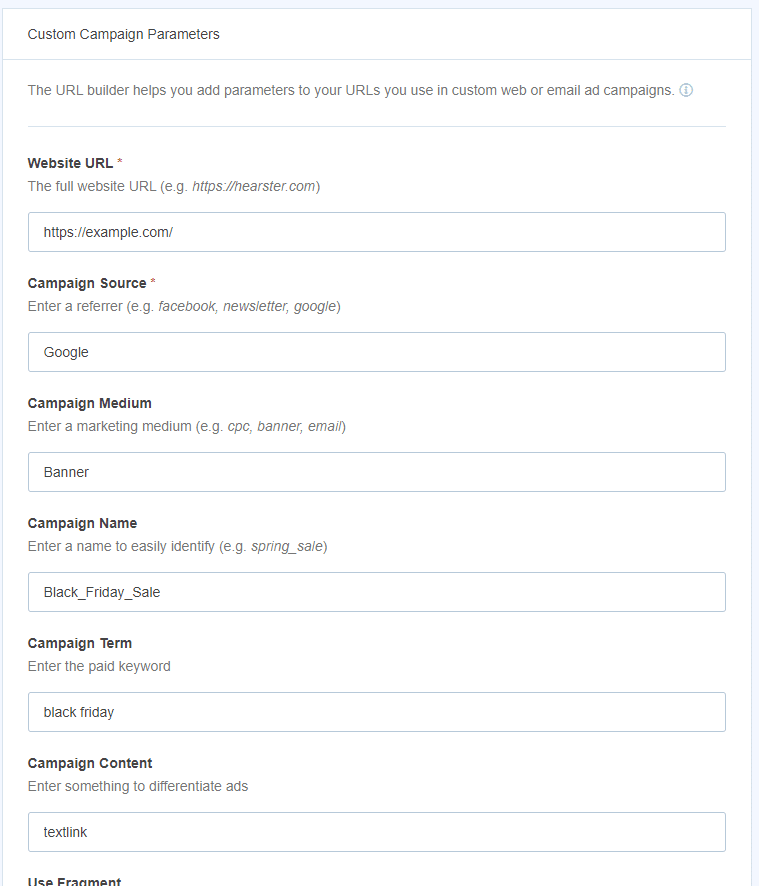
Once you’re using campaign UTMs, you’ll be able to also track your campaign traffic and see reports right inside WordPress!
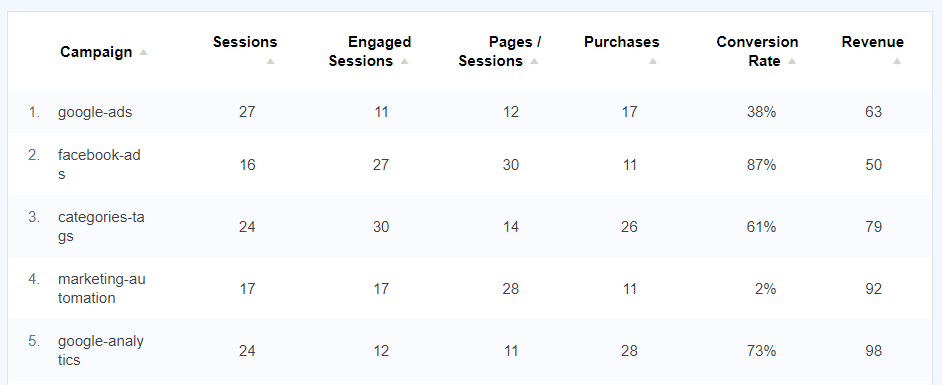
For more on using campaign URLs, read A Beginners Guide to UTM Parameters (And How to Use Them).
That’s it! We hope this article helped you understand what direct traffic is and why you need to use campaigns to correctly categorize your traffic.
If you enjoyed this article, you might also want to read:
- How to Find Google Analytics Referral Traffic Sources (GA4)
- Organic Search in Google Analytics: Quick-Start Guide
- What Are Google Analytics Channels? GA4 Channels Guide
- How to Set up Google Analytics Social Media Tracking
Not using MonsterInsights yet? Get started today!
Finally, follow us on YouTube for more helpful Google Analytics tips and tutorials.
Direct Traffic FAQ
Why is my direct traffic so high in Google Analytics?
High direct traffic in Google Analytics can result from a list of different factors:
- Users typing your URL directly or using bookmarks (legitimate direct traffic)
- Improperly tagged marketing campaigns lacking UTM parameters
- Dark social traffic from messaging apps and social platforms that strip referrer data
- Links clicked in emails that don’t pass referrer information
- Secure (HTTPS) to non-secure (HTTP) site transitions
- Offline document links (PDFs, Word docs)
- Session timeouts where returning visitors get counted as direct
Can social media traffic be counted as direct traffic?
Yes, social media traffic can sometimes be counted as direct traffic, particularly in cases of “dark social.” This occurs when users share links through private messaging, mobile apps, or secure browsers that don’t pass referrer information. Additionally, some social media platforms strip referral data from outbound links, causing visits to appear as direct traffic in analytics tools. This is more common with mobile apps and certain privacy-focused platforms.
How can I check what is causing my direct traffic?
Here are a few ways to check what is causing your direct traffic:
- Analyze landing pages for direct traffic in Google Analytics
- Check for spikes in direct traffic that coincide with specific campaigns you’ve started
- Use UTM parameters on all marketing efforts to isolate true direct traffic
- Implement user surveys or on-site polls to ask visitors how they found you
- Use custom dimensions in Google Analytics to capture additional user data

Creating utm parameters is a good way to track marketing efforts and avoid direct traffic count. Yes, yiu are right most of the direct traffic shown in the Analytics is organic traffic. Thanks for sharing.
I was able to learn the meaning of Direct traffic. Thanks for the article!
How best to track newsletter subscriber traffic?
My client’s agency uses mail chimp to send out NL for 4000 subscribers.
Except opening rates which is 30% no other parameters or segmentation done.
How to track the subscriber traffic returning to website for further engagement etc?
Hey there,
Great question! The easiest way to track newsletter traffic is by using Campaigns (UTM parameters). We have a guide on that here: A Beginners Guide to UTM Parameters (And How to Use Them)
When you first launch a new website and quickly start getting lots of direct traffic with only limited traffic coming from organic search. I think it can only mean that awareness of your website is going around by word-of-mouth or/and email because people like your content and are promoting your website to their acquaintances, and that can’t be a bad thing.
Hey David – You’re right, there is definitely some good direct traffic! I would just filter out as much of your own traffic as you can to make sure it’s not you and other contributors adding direct visits: https://www.monsterinsights.com/how-to-create-an-ip-address-filter-in-google-analytics/